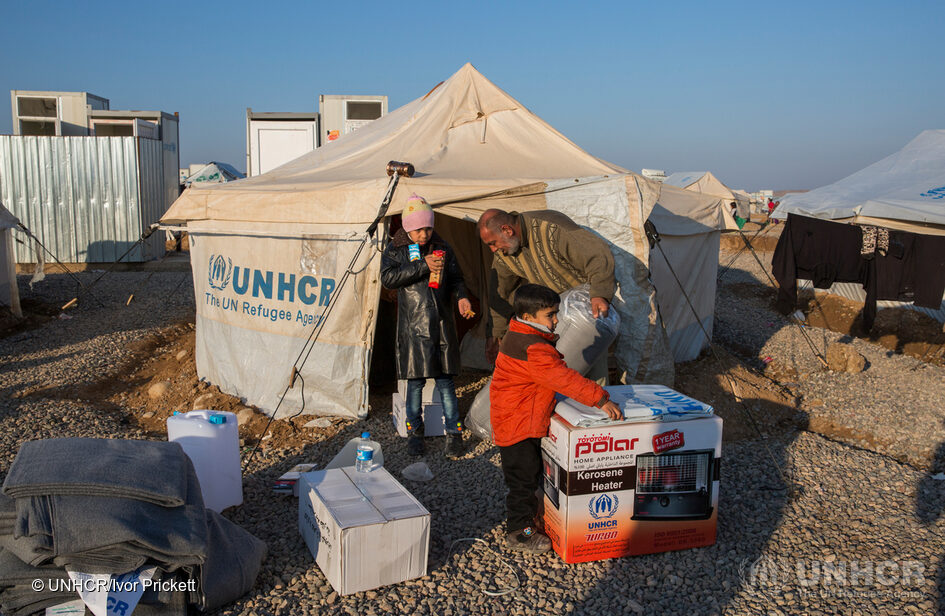UNHCR has released USD 2 million from Denmark’s Emergency Reserve Fund to provide immediate help to people who have been forced to flee their homes in Iraq and Burundi. The grants from this fund will provide men, women and children who have abandoned everything with access to basic services and core relief items.

Haytham and his son collect their non-food items at Hasansham camp. They fled militant held west Mosul 3 days before by crossing the Tigris river at night in a small wooden boat. Upon arrival at UNHCR’s Hasansham camp he said "I am so happy I could cry”. © UNHCR/Ivor Prickett
“Denmark’s Emergency Reserve Fund enables UNHCR to immediately respond to critical needs of refugees in seriously underfunded crisis situations. In times when the gap between enormous humanitarian needs and UNHCR’s resources is widening, this flexible support from Denmark, as one of UNHCR’s most important donors and partners, is more crucial than ever”, says Pia Prytz Phiri, UNHCR Regional Representative for Northern Europe.
Iraq situation
Over 300,000 Iraqis have been forcibly uprooted from their homes, following the launch of the military operation to retake the city of Mosul in February 2017. Intensified fighting in the western part of Mosul and extreme food shortages have resulted in families leaving the city in haste with the minimum of belongings.
In Mosul, an estimated 400,000 people are still living in the Old City and with no indication of cessation of hostilities, the situation is becoming more acute. Some of those arriving are staying in UNHCR camps, but the majority of people are settling outside. The funds from Denmark will support UNHCR and partners in constructing and managing 12 camps hosting up to 200,000 people and assist those outside of camps with mobile protection and distribution teams. UNHCR has distributed more than 33,000 core relief kits, including essentials like stoves, utensils and jerry cans, reaching over 140,000 outside of camps and some 400,000 people in total.
“We were starving for one month, just feeding the children water and flour, and sometimes we could improve the diet with a bit of tomato paste. It was either stay and die, or flee and risk death. Hunger was the main reason for us to leave,” said Adil, 34, describing his family’s recent escape from west Mosul.
Trauma casualty rates remain high in Mosul. Children are being separated from their families, and people, including women and children are confined to areas with limited humanitarian access. The funds from Denmark will be crucial in helping UNHCR trace and reunite family members and provide access to safety to people now trapped between fighting.
Burundi situation
In Tanzania, available resources are not keeping up with the rapidly growing needs springing from increasing numbers of refugees arriving, the majority being women and children from Burundi. Camps are over-crowded and access to basic services such as water is limited. Women and girls, being particularly vulnerable in a forced displacement context, are in need for urgent protection, safety and support.
Since the outbreak of violence in Burundi in 2015, over 238,000 Burundians have fled to neighbouring Tanzania, making it the largest host to Burundian refugees in the region. Individuals fleeing Burundi continue to arrive on a daily basis and urgent life-saving assistance is needed. With the emergency funds from Denmark, UNHCR will focus on providing shelter, core relief items, medical aid, psychosocial counselling, access to education, health, and water and sanitation for Burundian refugees and asylum-seekers in the camps, the majority of whom are women and children.
UNHCR will also enhance its protection activities at the border, which are essential to ensure that those in need of international protection continue to access their rights as guaranteed under the Tanzanian refugee law and international legal instruments. This grant will also support UNHCR in preventing and responding to sexual and other forms of gender-based violence, as well as in identifying solutions and providing persons of concern with the necessary support.
UNHCR continues to call for further funding support from donors and individuals as operations remain severely underfunded. To date, Tanzania has received no funding specifically for the Burundi refugee situation under the UNHCR’s Tanzania requirements of USD 112.5 million for 2017, and is relying fully on unearmarked or broadly earmarked funding. The funding needs for displaced Iraqis in the Mosul region and beyond is USD 578 million, of which only 18 percent has been funded.
Denmark as a donor to UNHCR
Denmark contributes with an Emergency Reserve Fund of DKK 50.5 million (USD 7.2 million) at the start of every year which UNHCR can allocate to where the needs are most urgent. The flexibility of the fund allows UNHCR to respond to emergencies which saves lives and assists displaced people with critical protection needs and acute basic necessities. The fund is also of vital importance to support so-called “forgotten” refugee crises which are critically underfunded as they attract little or no public attention.
Denmark has long ranked among UNHCR’s top ten donors, and was UNHCR’s 9th government donor in 2016 and 5th largest donor per capita. In addition to the Emergency Reserve Fund, Denmark’s other flexible support includes DKK 160 million in unearmarked funding.
The article has also been published in Danish Development Magazine ‘Globalnyt’
Share on Facebook Share on Twitter